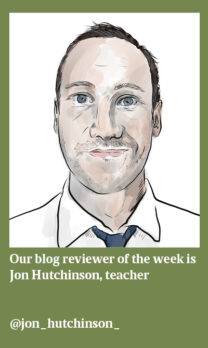This week’s top blogs look at leadership and strategy, curriculum and generative learning, and the frameworks for early careers and reading
Strategy: a 2,500 year-old history
@joe__kirby
Almost a decade ago, Joe Kirby was at the vanguard of an educational revolution. I had just started teaching, and drank in everything he wrote. I’ve often revisited his posts from 2013 and reflected on how they could be published today and still seem ahead of the curve. But then, we entered a Joe-Kirby-dark-ages, as he hunkered down to apply his ideas at the chalkface. Now, he has returned.
Blogging with the same trademark mixture of iconoclasm and reasonableness, Kirby turns his attention here to strategy. He argues that school leaders often wrestle with this conundrum of what to prioritise, and surveys thinking on the topic from Sun Tzu to the EEF, drawing out the insights from each. His informative analysis warns of common pitfalls with ‘template’ approaches, before offering a clear (though challenging) alternative.
Reflections from ResearchEd 2021
@greeborunner
For thousands of teachers, ResearchEd conferences have become a cherished CPD and networking event, with the national conference in September a particularly special event. In this blog, Zoe Enser sets out her highlights from the day.
To begin with, Enser summarises a talk from David Didau unpicking a phrase that has become almost cliché in recent years: the curriculum is the progression model. After this, a commentary is provided on Paul Kirschner’s talk on generative learning, which Enser recalls watching with some trepidation having recently authored a book on the same topic.
This post offers some key insights into big ideas, and reminds us of how important ResearchEd is in connecting classroom teachers with academics to discuss research and provide mutual understanding and growth.
A note on shifting from the vehicle
@SaysMiss
When teachers were first consulted on the new early career framework, the response was overwhelmingly positive – rare for any education policy, let alone one that would have such a profound change for the profession. Now though, as the policy collides with busy classrooms, some dissent is emerging.
As Kat Howard insightfully notes in this blog, this may be due to the fact that starts of conversations are easy. Speaking in the abstract is safe. However, as Howard puts it, “now we can move onto something a little meatier. But meatier is problematic.”
Here, using examples of concepts and strategies from cognitive science that have become common language in many schools, Howard attempts to put ‘meat on the bones’ in a way that avoids both genericism and lethal mutations. She draws on examples from her own specialism of English, but those in other disciplines will undoubtedly benefit from following the process, ready to do the same in their subjects.
Guest blog by Helen Bradford: The DfE’s new reading framework
@earlyed_uk
The most passionate debates in schools often start with one of two topics: how we should teach children to read, and how we should teach children in the early years. Too often over the years, I’ve seen these debates descend predictably and unhelpfully into binary pro- vs anti-phonics shouting matches.
Given that context, the Department for Education’s new Reading framework: teaching the foundations of early literacy was bound to court some pushback. But amid the noise, this blog from Early Education associate, Helen Bradford sets a new standard for constructive criticism. Its forensic, personal and measured look at the framework is insightful and thought-provoking.
Putting my cards on the table, I’m broadly supportive of the DfE’s guidance. Yet I am in no doubt that anyone who may need to teach children to read – which really is just a convoluted way of saying ‘teachers’ – would benefit hugely from reading this critique.
Whichever side of the debate you fall upon, your position will be more nuanced, informed and balanced after reading what Helen Bradford has to say on the matter. I know mine is.













Your thoughts